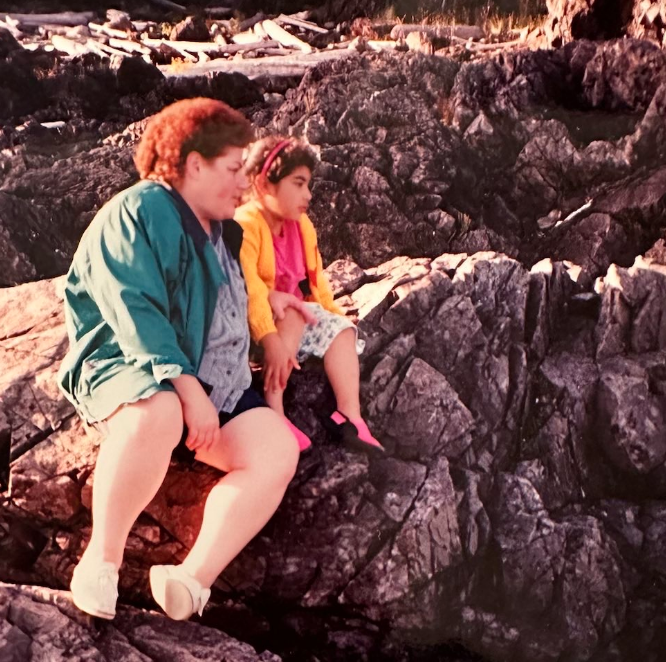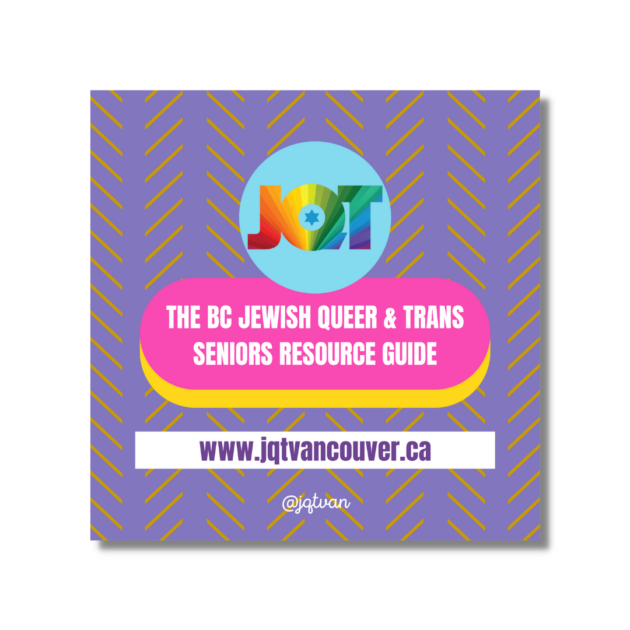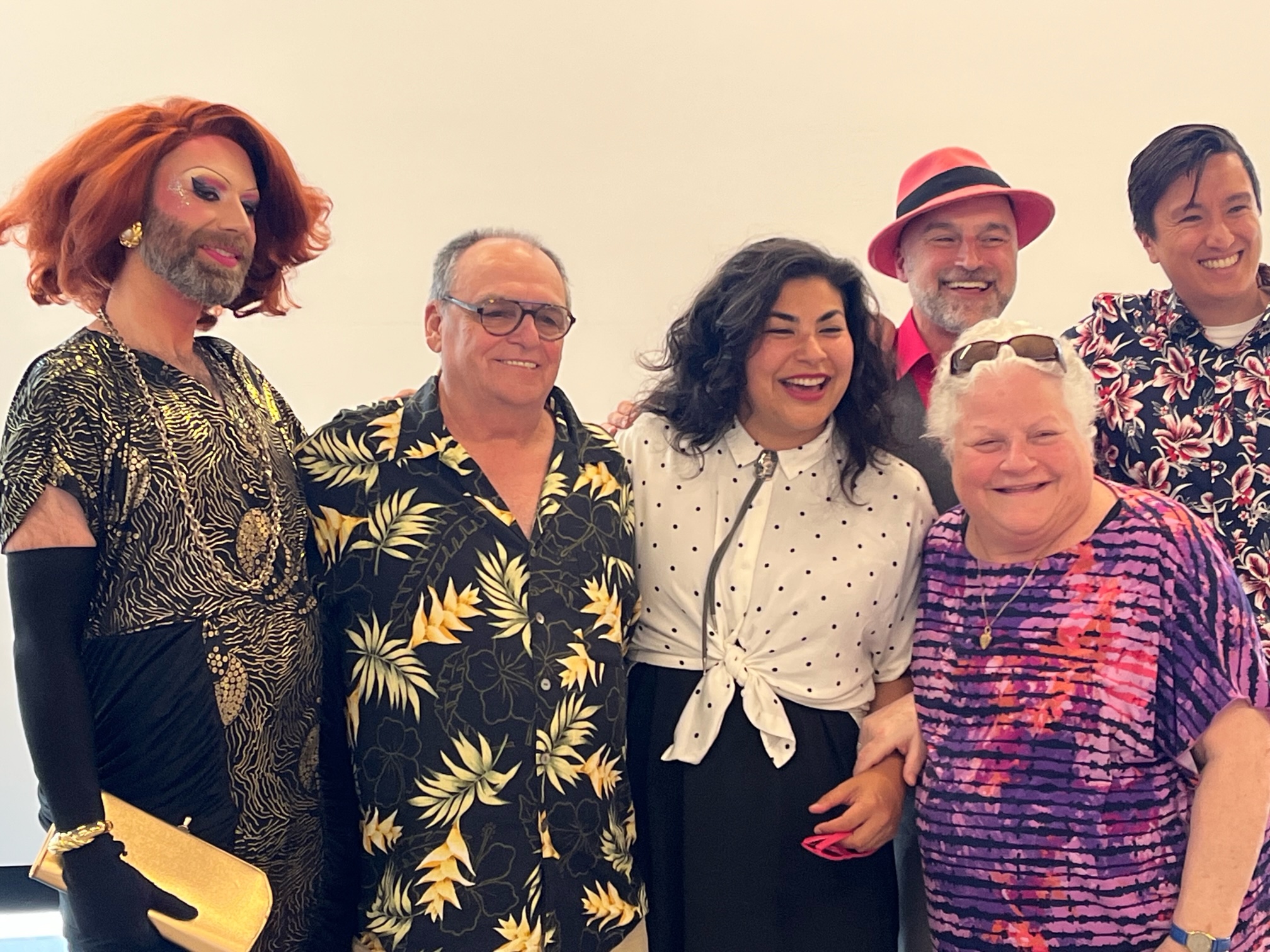
Caring For, and Learning From, Queer and Trans Elders
As a child, my mom, Dr. Dalia Gottlieb-Tanaka, a brilliant pioneering gerontologist on creativity and dementia, would bring me along to site visits of senior care homes across North America and even Israel. I saw residents’ eyes sparkle and their bodies come to life when they heard me play greatest hits from the 1920s to 1940s on my fiddle.
I also witnessed the misery of residents who were chained to their plastic chairs with seat belts, staff too busy to change the static screen on the TV. These visits exposed me to how our society treats our elders and highlighted the hard work of my mom (and those like her) who moved mountains to increase the quality of life of senior care residents by providing them access to culture, music and poetry. While medical care is vital, it is unable to provide the cultural medicine we as humans so desperately need and have the right to experience at any age and in any state of care.

Fast forward thirty years, I am now the founder and executive director of JQT Vancouver, a volunteer-run Jewish queer and trans nonprofit. While everyone was busy baking sourdough bread, our COVID activity was conducting the BC Jewish Queer & Trans Oral History Project, which focused on collecting the experiences of Jewish LGBTQ2SIA+ (Lesbian, Gay, Transgender, Queer, TwoSpirit, Intersex, Asexual and more) people—primarily 65+ years—across the province of British Columbia. This oral history project, along with our community needs assessment Twice Blessed 2.0: The Jewish LGBTQ2SIA+ Initiative, provided JQT with a sobering discovery that our elders fear going back into the closet and/or having to hide their Jewish identity upon entering assisted living and long term care.
One of my interviewees in the oral history project, Jeff Kushner in Victoria, BC, shared:
“It’s a concern that I have… of having to go back into the closet… as I age. Now as long as [my partner] and I are living in our home, and as long as at least one of us are able to supervise a caregiver, it’s no problem. But if one or both of us were required to go into long-term care, I’d be really concerned. And I am really concerned… both as a Jewish person and as a gay person.”
And he is not the only one to have this fear, which is growing out of past and present homophobia, transphobia and antisemitism in care organizations, among caregivers and the residents themselves.
As such, many are also choosing to stay in their home well after they require healthcare support—and many simply cannot afford private at-home care. It’s gut-wrenching to learn that history is repeating itself and that our elders are still having to hide parts of their identity. For many people interviewed, it brought up the not-so-past trauma of it being illegal to love who you love. This isn’t to say that there aren’t organizations and caregivers who are truly outstanding and making positive changes; it’s just not a given across the board.

To help Vancouver’s older adults—and my future self—navigate this challenging landscape of care, we created the JQT Seniors Initiative, a Community Response Network of Jewish, LGBTQ2SIA+ and seniors healthcare organizations, which recently produced The BC Jewish Queer & Trans Seniors Resource Guide. It is a report card on what you can and cannot expect/plan for as a Jewish LGBTQ2SIA+ person in the Jewish community, in the queer and trans community, and in the healthcare system across British Columbia in the year of 2023.
At present in British Columbia:
- Intake assessments generally do not include questions about sexual orientation or other aspects of a person’s gender identity. It is up to you to decide if or how you wish to disclose this information.
- There are no LGBTQ2SIA+ options for Adult Day Care, Assisted Living, Long Term Care or Palliative/Hospice Care.
- Level of assistance vs level of competency may not be sufficient for your needs. For example, LGBTQ2SIA+ competency training and inclusion work varies, is slow and not public knowledge especially in healthcare. Further, non-Jewish homes may not be competent in providing you with the Jewish care you need.
- Orthodox Jewish law may conflict with services such as Medical Assistance in Dying (M.A.I.D.).
- Intermarriage and LGBTQ2SIA+ inclusion in Jewish burial and experience among rabbis varies (i.e. Chevra Kadisha performs according to male or female genitalia, which is not inclusive of trans and nonbinary bodies, and non-Jewish partners may not be permitted to be buried in some Jewish cemeteries).
I shared the first draft of this resource guide with Jeff Kushner, who generously contributed to the project, and with my mom, of course. Naturally, she critiqued it like any good academic—mostly on how it was formatted (shared documents are still novel), but she quickly understood that the content was unprecedented and would make a tidal wave impact. Anonymous feedback on the guide indicated that older JQT adults do not feel that their intersecting Jewish and LGBTQ2SIA+ needs will be sufficiently met by their respective communities—and that the guide will be invaluable for making advanced care preparations. One respondent shared, “I feel seen and grateful that this guide has been resourced and put together… and even considering the older folks, as I think we tend to often feel overlooked.”
Ever since I founded JQT, my mom forwards me all the articles that grace her virtual desk on caring for queer and trans seniors, which is part of our bonding tradition and is a frequent reminder that she loves and accepts me. I was recently invited to speak on a “Sharing Queer History” panel at the Museum of North Vancouver. As it was a 10-minute drive from where I grew up, I brought along my mom—who has no idea that I’m writing this article—who very proudly stood up at the end to share her educational journey on LGBTQ2SIA+ issues as a parent and in her world of gerontology. Our fabulous drag moderator referred to her as an icon and was ushered to take a group picture with us! This work is personal—as much as we want to help others, we also want a better future for ourselves as we become more dependent on healthcare. Because depending on where you live, your financial means, and access to community support, our future’s looking rather bleak.

But there is room for hope. Progress is happening, albeit at a glacial speed. In my mom’s lifetime, she saw the senior care conversation evolve to include LGBTQ2SIA+ and other marginalized voices, and I’m advocating to make sure this continues to be the case. So that in my lifetime, I will see healthcare and Jewish institutions provide safer options for all LGBTQ2SIA+ elders with intersecting religious/cultural identities.
Carmel Tanaka (she/her) is a community engagement professional. She founded JQT Vancouver (a volunteer-run Jewish queer & trans nonprofit), Cross Cultural Walking Tours and the Jewpanese Project. Learn more at www.carmeltanaka.ca and www.jqtvancouver.ca



